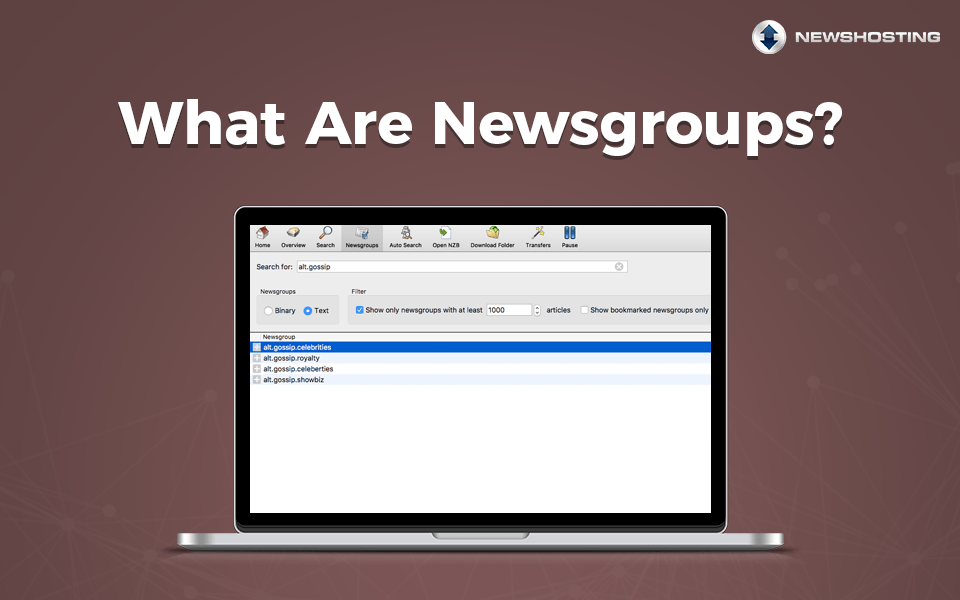
Do You Need a VPN for Usenet?
It is not required, but it is recommended. A VPN provides privacy across the Internet, including when accessing Usenet Indexers and tools. SSL protects traffic between you and the Usenet provider, but a VPN adds full-connection privacy.
Table of Contents
Usenet offers access to newsgroups across thousands of topics, distributed through a decentralized global network. While access typically runs through a secure connection using SSL (Secure Sockets Layer), many users still ask if a VPN adds any real benefit.
Want to learn more about how Usenet works? Visit our What is Usenet guide.
What a VPN Does
A Virtual Private Network (VPN) encrypts all Internet traffic and routes it through a secure server. This secures your IP address and online activity from your Internet service provider and anyone monitoring your connection.
VPNs are commonly used to:
- Avoid throttling or monitoring by Internet service providers
- Keep browsing activity private
- Mask location for regional privacy
How VPN Applies to Usenet
Most reputable Usenet providers, including Newshosting, support SSL encryption, which protects connections to Usenet servers. However, SSL connections through your Usenet provider only protect your Usenet browsing, and any online activity outside of Usenet could be exposed.
There are additional privacy advantages to using a VPN:
- Adding Anonymity: While SSL encrypts specific Usenet traffic, a VPN covers all activity across the Internet, including visits to Indexers and Usenet-related tools.
- Protecting IP Address: Some Usenet search tools log visitor IP addresses. A VPN secures the source IP, adding another layer of privacy.
- Bypassing Censorship: Some networks or regions may limit access to newsgroup services. A VPN routes around such blocks.
Comparison: SSL vs. VPN vs. Both
| Feature | SSL Only | VPN Only | SSL + VPN (Best Practice) |
|---|---|---|---|
| Encrypts Usenet Access | ✅ | ❌ | ✅ |
| Encrypts All Internet Use | ❌ | ✅ | ✅ |
| Hides IP from Indexers | ❌ | ✅ | ✅ |
| Protects Against ISP Logs | ❌ | ✅ | ✅ |
| Blocks Local Restrictions | ❌ | ✅ | ✅ |
When a VPN Might Not Be Necessary
If SSL is enabled and the Usenet provider does not log access activity, some users may feel a VPN is optional. However, this leaves activity on the broader Web visible to network observers.
Best Practice: Use Both
For the most private and secure Usenet experience, it is generally recommended to:
- Use SSL connections for all Usenet access
- Use a VPN for added privacy across all Internet traffic
Newshosting offers an unlimited VPN with the XL Powerpack plan and as an optional add-on for other plans.
When a VPN Helps with Usenet
- Connecting on public Wi-Fi networks (cafes, hotels, airports)
- Accessing Usenet from universities, workplaces, or countries with restrictions
- Visiting Web-based Usenet sites
- Avoiding Internet service provider monitoring or throttling
FAQ
Is a VPN required to use Usenet?
No, but it’s recommended if privacy is a concern beyond just Usenet server traffic.
Does Newshosting include a VPN?
Our best Usenet plans include an unlimited VPN. Other plans can add VPN access as an optional upgrade.
Will SSL alone keep my activity private?
SSL encrypts traffic between you and the Usenet provider, but doesn’t protect visits to Indexers or other online services.
When is a VPN especially useful for Usenet?
If you access Usenet over public Wi-Fi, use Web-based search, or want to prevent ISP monitoring, a VPN adds protection beyond SSL.
Conclusion
A VPN is not required to access Usenet, but it significantly strengthens privacy, especially outside the Usenet client itself. When paired with SSL, a VPN helps shield activity across the entire Internet—making it a smart addition for any privacy-conscious user.






